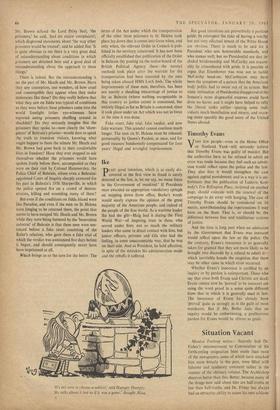Ike
`Dumas good intention, which is as easily dis- Pcovered at the first view as fraud is surely detected at the last, is, let me say, no mean force in the Government of mankind.' If Presidents were awarded an appropriate valedictory epitaph on stepping down from office, Burke's words would surely express the opinion of the great majority of the American people, and indeed of the people of the free world. As a wartime leader Ike had the gift—Haig had it during' the First World War—of inspiring trust in those who served under him; not so much the military leaders who came in direct contact with him, but junior officers, privates and GIs who had the feeling, in some unaccountable way, that he was on their side. And as President, he held affection, in spite of the mistakes his administration made and the rebuffs it suffered. But good intentions are proverbially a perilous guide. In retrospect the risks of having a worthy but not very effectual tenant of the White House are obvious. There is much to be said for a President who sets honourable standards, and who means well; but no Presidential era that in- cluded brinkmanship and McCarthy can reason- ably be remembered with pride. It is possible to argue that Eisenhower was wise not to tackle McCarthy head-on; McC'arthyism may have been the symptom of a poison that the American body politic had to sweat out of its system. But some intimation of Presidential disapproval of the Senator's more disgraceful excesses could have done no harm; and it might have helped to rally the liberal ranks earlier—sparing some indi- viduals much humiliation and misery, and rescu- ing more speedily the good name of the United States abroad.


































 Previous page
Previous page